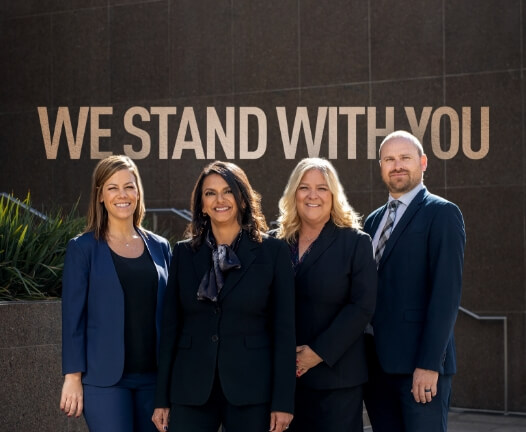San Diego
Sexual Assault
Attorneys
I Am Seeking Answers And Not Sure If I Need A Sexual Assault Attorney.
Whether you are a survivor of sexual assault or unsure if what happened to you is considered sexual assault, you have come to the right place. Seeking answers is the first step in advocating for yourself. We know it can be scary. Most survivors who come to us have never been involved in a legal matter before and do not know what to expect. Many survivors do not want to share their experience with a stranger and relive their trauma. That is why our entire team is trained on being culturally sensitive and providing trauma-informed service from start to finish. We have a full-time credentialed victim advocate on staff to support you through the entire process. We believe you. We are not here to judge you or pressure you. Being violated can feel like you had your power taken away. We want to help you take back your power. We honor your decisions every step of the way.
Contact us online or call (619) 342-8000 for a free initial case evaluation to learn more about how we can help you during this sensitive time.
What If I Cannot Afford An Attorney?
We work on contingency, which means that you do not pay any fees or costs upfront. In fact, you do not pay anything if we do not win. If we win your case, our fees are paid by a percentage of the amount of money we are able obtain on your behalf.
We have a 99% success rate.
What Is Sexual Assault?
I Am Not Sure What Happened to Me Was Sexual Assault.
Sexual assault is illegal sexual contact that usually involves force upon a person without consent or is inflicted upon a person who is incapable of giving consent (because of age or physical or mental incapacity) or who places the assailant (such as a doctor) in a position of trust or authority.1 The legal definitions for terms like rape, sexual assault, sexual battery, sexual abuse, and sexual harassment vary from state to state. The state of California does not have only one sexual assault designation for criminal matters. For civil matters, we do not have to prove a crime has been committed. Therefore, we take into consideration all the actions that harmed the survivor physically or emotionally. No matter what happened to you, it is important to consult with an attorney rather than make assumptions of whether what happened to you “qualifies” as something for which you can seek legal action.
Examples of Sexual Misconduct:
Any unwanted or nonconsensual touching whether clothed or unclothed
Sending or requesting nude photos
Sexual communication via text, app, email, voicemail, social media or in person
Exposing themselves or performing sexual acts in your presence
Exposing you to porn
Exploiting or coercing you to send nude photos or perform sexual acts
What If I Did Not Speak Up or Fight Back?
No matter how you responded, what happened to you was not your fault. We know from working with survivors of sexual assault that it is common to be afraid to speak up or fight back. Another common response is to shut down all together and hope it will end soon. Your body and your brain have natural physiological and neurobiological responses to trauma that were designed to protect you and keep you safe. Those safety mechanisms take over when your body perceives danger. Consent should be freely given without fear, coercion, fraud, violence, or threat of violence. Consent can be revoked at any time. Consenting to sex on one occasion does not constitute consent for another occasion. Consenting to certain sexual acts does not equal consenting to all sexual acts. Regardless of the circumstances, the law says there are certain factors in which a person does not have the capacity to legally consent. Factors Considered When Determining The Capacity To Legally Consent:
Age:
Minors cannot consent. In California, the age of consent is 18 years old.
Disability:
If the victim has a physical, intellectual, or developmental disability, or other form of mental incapacitation, such as a traumatic brain injury.
Intoxicated:
If the victim was intoxicated from alcohol or drugs and unable to give consent.
Unconscious:
If the victim was sleeping, sedated, strangulated, or suffering from physical trauma.
Vulnerable or Compromised Adults:
If the victim is considered a vulnerable adult such as an elderly or ill person or if they are a dependent adult.
Relationship of victim and perpetrator:
If there is an unequal power dynamic between the victim and perpetrator or if the perpetrator is in a position of authority such as a teacher, doctor, correctional officer, or supervisor.
Do I Need To Get A Rape Kit?
If the assault happened within the last five days, it is best to call your local rape crisis hotline and get all your questions answered about your options before it is too late to collect evidence. You can have a forensic exam completed even if you are unsure if you want to press charges or take legal action. The purpose of the forensic exam is to check that you are physically okay, collect DNA evidence, test for sexually transmitted infections, and if needed, offer you preventative medications. Evidence can be collected from clothing as well so be sure to take whatever you were wearing at the time of the incident. Having a forensic exam does not make you obligated to press charges or take civil legal action, but it can potentially help with both the criminal and civil case if you wish to pursue criminal or civil justice.
What If I Did Not Go To The Hospital Or Get A Rape Kit?
The trauma caused by sexual assault can cause survivors to immediately withdraw, shut down, dissociate or mask their feelings by staying busy. It may take a while before a survivor feels strong enough to seek help and by then the window for collecting forensic evidence for the rape kit may have passed. Not to worry, it is okay. You do not have to have a rape kit completed to take civil action. However, if the assault happened in the last three to five days and you are considering any type of legal action, a forensic exam to collect DNA evidence would be good to have to help build your case but is not required.
What Is The Statute of Limitations for
Sexual Assault in California?
The answer to that question is not as simple as it may seem. Statutes of limitations can change from year to year. Those changes are not retroactive so the current statute of limitations may not apply to the date of the incident(s). Additionally, some states may pass a temporary reprieve of a statute which allows claims where the statute had expired to be filed for a certain period of time. Most importantly, the statute of limitations for filing a civil lawsuit for sexual assault are dependent on many factors and should be discussed with a civil law attorney experienced in working with sexual assault survivors as soon as possible because once the statute of limitations expires, you can lose your right to take action. Here on some considerations that a lawyer will use to determine the statute:
How old was the victim at the time of the assault?
Where did the sexual assault happen?
What was the relationship between the victim and the perpetrator?
Are there any circumstances that can toll (pause the clock) the statute of limitations?
What If I Want To Remain Anonymous?
We understand that navigating the justice process can be intimidating and feel like another violation of your privacy. You have a right to remain anonymous on public records. Depending on how the matter is resolved, not all civil cases will become public record. In the event, we file a claim (lawsuit) on your behalf, we can use an alias such as Jane Doe, John Doe, or initials if those aliases do not feel representative of how you identify. The parties who are considered responsible for what happened to you, including the offender, and any person, institution, or organization whose negligence led to the harm you suffered has a right to know who is holding them accountable. Therefore, they are entitled to know your identity. You are entitled to confidentiality in many forms, and it is important to consult with an attorney to understand how we can protect you.
I Do Not Want To Be Labeled A Victim!
We understand that words, especially labels, can hurt or feel shameful. We use the word survivor and victim as it fits the situation. In the words of the law, you are a victim of a crime if a crime has been committed against you. We know that if you are here, you were probably a victim and now you are a survivor or a human trying to survive. We choose the word survivor in our law practice and daily vocabulary because we feel it is more empowering. However, being a victim of a crime is nothing to be ashamed of. As a victim you have a right to seek justice. You can be both a victim and a survivor. We are not here to label you and we honor all survivors’ choices.
How Much Is My Case Worth?
We understand that part of the decision to file a lawsuit might be determined by deciding if the potential monetary reward is worth putting yourself through civil litigation. However, we are not able to give you an estimate of the dollar amount. Every case must be evaluated individually based on the circumstances of that particular case. There are many factors to be considered and even when cases appear to be similar by comparison, it is often not apple to apples. We pledge to investigate, research, strategize and fight to get the maximum amount of money for you while minimizing your exposure to trauma. We are your legal advisors, but all settlement offers must be approved by you. We believe it is very important to manage expectations and not provide false hope with numbers not relevant to your case. Therefore, we rarely post the dollar amounts we have won on behalf of plaintiffs.
Who Can Be Held Responsible
For Sexual Assault In A Civil Lawsuit?
Every case is unique and could have more than one responsible party. After reviewing the facts of your case, we would determine who is responsible or culpable for what happened to you. We would fight to hold all parties responsible, which could include:
- The person(s) who harmed you
- Professors
- Coaches / Athletic Directors
- Clergy / Church Staff and Volunteers
- Doctors / Nurses / Nurses Assistants
- Dentists
- Chiropractors
- Physical Therapists
- Home Care Aide
- Landlord
- Security Officer
- Others who enabled the incident
- Institutions and Organizations who were negligent
- Universities / Campuses
- Fraternities / Sororities
- Churches
- Sports Teams
- Athletic Associations
- Medical Facilities, Treatment Providers, and Staff
- Hospitals
- Clinics
- Outpatient Treatment Centers
- Medical Groups
- Behavioral Health / Mental Health / Psychiatric
- Dental Offices
- Ambulance Companies
- Other Licensed Facilities
- Elder Care / Nursing Homes / Hospice Care
- Residential Care Facilities / Assisted Living
- Home Health Agency / Home Care Aide
- Continuing Care Retirement Communities
- Developmentally Disabled Adult Care Facilities
- Rehabilitation Treatment Providers
- Residential Treatment Facilities
- Sober Living Facilities / Rehab Facilities
- Inpatient / Outpatient
- Businesses
- Spas
- Hotels and Resorts
- Airbnb / Short-term rental owners
- Uber / Lyft / Rideshare Owner
- Homeowner where incident occurred
- Non-Profit Organizations
- Churches / Religious Entities
- Volunteer Organizations
- Municipalities / Government
- Police Department / Law Enforcement Agencies
- Fire-Rescue Department
- Cities / Counties
- Military
- Employers
Can Filing A Civil Lawsuit Lead To Change?
Every 68 seconds, an American is sexually assaulted. Meanwhile, only 25 out of every 1000 rapists will end up in prison. Many survivors feel let down by the criminal justice system and seek other methods for holding the responsible parties accountable. Civil justice is very effective in holding responsible parties accountable. Often survivors who call us will say that they do not care about obtaining money, they just want to make sure what happened to them does not happen to others. The legal purpose for filing a civil lawsuit is to obtain money to make the person whole again. We understand that no amount of money can change what happened to you. Our goal is to help you get the money necessary to help you on your healing journey by whatever means will help you. We also understand that part of healing can be to create change and to know the offender will not be able to harm others. While we can never promise that it will not happen to others, from our experience working with survivors and holding responsible parties accountable, we see that civil claims can create a broader impact in addition to monetary compensation for the survivor. Potential Impacts Of Filing A Civil Lawsuit For Sexual Assault:
- Civil claims can expose a person who has been harming others for years, even decades, and getting away with it.
- Civil claims can expose institutions who have passed the trash by allowing offenders to quietly resign and move to another position or institution where the offender continues to harm others.
- Civil claims paid by insurance companies often result in organizations being forced to provide better prevention training for their staff or risk higher insurance premiums.
- Civil lawsuits can create a public record of the offense, the offender, and the institutions that were negligent in keeping you safe, while keeping the victim’s identity confidential.
- Civil claims create awareness and awareness is the first step to creating change.
- As part of the negotiation process, a plaintiff can make requests of organizations to implement changes to their policies and procedures. Sometimes the requests are granted. We can certainly make the request, but we cannot guarantee it will be granted.
Why Should I Choose Haeggquist & Eck To Represent Me?
- Our attorneys focus on representing survivors of sexual assault, sexual harassment, and discrimination. We are not trying to be everything to everybody.
- We only represent those who have been harmed. We are plaintiff attorneys, not defense attorneys. We never defend offenders or organizations.
- You will always have direct contact with your lawyer on a regular basis. This ensures you are always kept updated and not left wondering what is happening with your case.
- We recognize that you are a human being going through one of the toughest experiences in your life. We honor your vulnerability by being intentional with our communication and actions every step of the way.
- We keep our caseloads small per attorney to ensure your case progresses as quickly and efficiently as possible because we understand the waiting can cause anxiety for survivors. This also ensures you and your case get the personal attention it deserves.
- Each client has a dedicated legal team working with you on your case that includes attorneys, paralegals, legal assistants, and a survivor advocate. Having a full team for each client ensures your case has the resources it needs to move forward and be resolved as soon as possible.
- We invest in resources that help build the strongest case possible for maximum recovery.
- We are unique because we have a credentialed victim advocate on staff full-time.
- We invest in our team to stay healthy and prevent burnout so they can serve from a full cup.
- We are a rare woman-owned law firm.
- We donate a percentage of all profits to charity annually.
- We walk the talk. Our team volunteers their time to several different organizations annually that align with the values of our firm and the clients we represent.
- We serve on committees for survivor organizations and provide pro bono work for victims of underrepresented populations.
- We strive to stay survivor-focused and culturally sensitive and have regular team training.
- Our law firm is led by and was started by a survivor.
When you are ready to stand up for yourself, we will stand with you!
Contact Haeggquist & Eck, LLP online
or call (619) 342-8000 for assistance!




